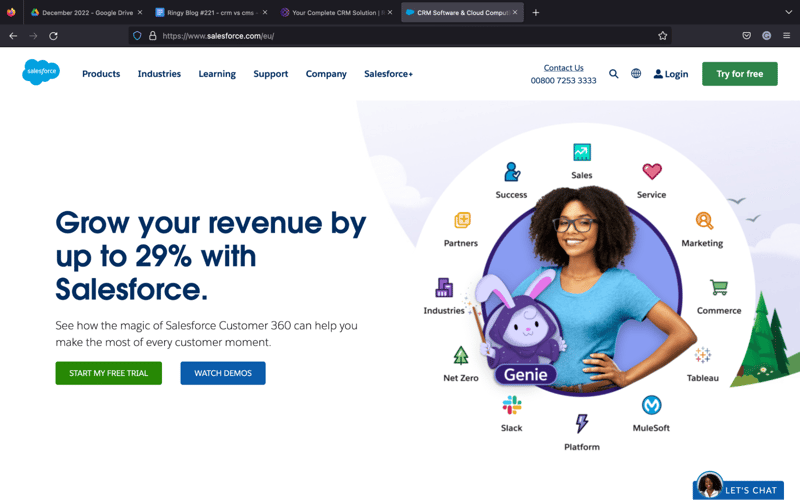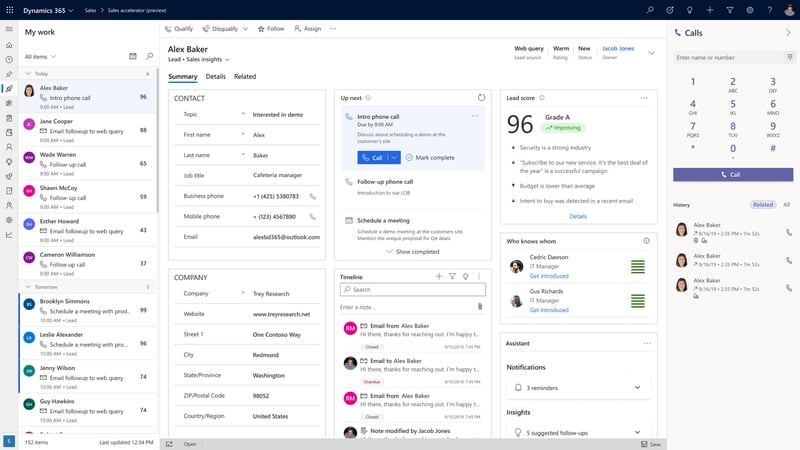
Types of CRM: How to Choose the Right One for Your Business
 Updated on
Updated on
By Ringy
Table of Contents
Table of Contents
Customers are the lifeblood of any business, and having a Customer Relationship Management (CRM) system in place is essential for successful customer management. But with multiple types of CRM out there, how do you know which one is right for your business?
Well, it all starts with the objectives of your business. Knowing what data you need to collect and how often will help you decide which CRM suits your needs.
Research estimates that over 90% of brands with more than 10 employees are using CRM to streamline their everyday operations. This shows that the CRM market will only grow over time.
So, you're on the right track if you've decided to consider choosing CRM software for your business!
Without taking too much of your time, let's look at the types of CRMs available and their features so you can choose the best one for your business.
5 Types of CRM
1. Operational CRM
Operational CRM is a type of customer relationship management (CRM) that focuses on automating and streamlining operational processes. It helps businesses to track, manage and store customer data, as well as manage sales and customer service activities.
With this technology, companies can better understand customer behavior, target customers with more relevant messages, and optimize their customer service strategies.
Operational CRM is the complete package for customer engagement, from marketing automation to customer relationship management.
For brands to have an effective operational CRM strategy, they must identify customer needs and trends, develop relevant content, track and measure performance, use analytics tools to understand customer behavior and adjust their strategy accordingly.
In simple terms, operational CRM helps companies to create better customer relationships and manage their day-to-day operations more efficiently.
What are the key features of operational CRM?
|
Features of Operational CRM |
Purpose |
|
Automation |
Operational CRM offers automation of mundane business processes and activities, such as customer service inquiries, marketing campaigns, sales operations, order processing, and more. |
|
Reporting |
Operational CRM provides businesses with real-time information on their customers, including data on their purchasing habits and preferences, customer satisfaction levels, and more. |
|
Real-time insights |
This type of CRM gives businesses real-time insights into customer behavior and trends, allowing them to make more informed decisions about how to serve their customers better. |
|
Personalization |
Operational CRM helps businesses personalize the customer experience by providing tailored messages and offers based on customer data. |
|
Lead Management |
With lead management, businesses can track leads and nurture them throughout the customer journey, making it easier to convert prospects into customers. |
But do all these features come with benefits, because that's what matters?
Yes! Operational CRM brings several benefits to businesses, including:
- Enhanced customer service: Operational CRM helps businesses to understand their customers better, so they can provide tailored customer service that meets the needs of each individual.
- Improved marketing campaigns: By collecting data on customer behavior and preferences, businesses can create more effective marketing campaigns that target the right audience with the right message.
- Better sales operations: Operational CRM allows businesses to track leads, sales opportunities, and customer interactions in real-time to make more informed decisions and close deals faster.
- Increased efficiency: Automating time-consuming processes with operational CRM helps businesses streamline operations and save time. In turn, this can lead to improved efficiency and productivity.
- Enhanced customer loyalty: With personalized messages and offers tailored to customers' unique needs, businesses can create a better overall customer experience and build long-term relationships that lead to increased loyalty.
Some good examples of types of CRM are
- Ringy (that's us),
- Salesforce,
- Microsoft Dynamics, and
- Zoho.
Overall, operational CRM is a powerful tool for businesses that want to manage their operations more efficiently and create better customer relationships.
With the right strategies, companies can use this type of CRM to improve customer service, increase sales, and boost overall profitability.
2. Analytical CRM

Analytical CRM is a type of customer relationship management (CRM) that uses data and analytics to understand customers better.
It seeks to measure, analyze, and improve customer interactions with an organization using data from CRM systems, such as sales records and customer service logs.
Analytical CRM focuses on understanding the customers who purchase a particular product or service, their buying patterns, and the types of interactions that are most successful in achieving customer satisfaction.
This type of CRM allows organizations to use predictive modeling and data mining techniques to understand customer behavior better and develop targeted marketing strategies.
Additionally, Analytical CRM can provide insight into problems with a company's existing processes and help identify areas for improvement.
Ultimately, the goal of Analytical CRM is to provide organizations with a better understanding of their customers and the types of interactions that are most successful in achieving customer satisfaction.
Some key components of Analytical CRM include:
|
Features of Analytical CRM |
Purpose |
|
Data Mining |
Data mining is a type of analytical CRM that uses data from traditional CRM systems to identify meaningful patterns, relationships, and trends in customer data. It uncovers hidden customer insights and understands customer behavior to improve the user experience. Data mining examines large amounts of data to look for correlations, which can then be used to predict customer behavior. |
|
Email Segmentation |
This is all about account-based marketing (ABM). Email segmentation involves using customer data to divide customers into different types of groups or segments. Once the customer types have been identified, email campaigns can be tailored to each type. This ensures that the right message is delivered to the right people at the right time. |
|
Marketing and Sales Optimization |
Data-driven marketing and sales optimization are key components of Analytical CRM that use customer data to improve customer communications, target more effectively, increase customer lifetime value (CLV), and maximize ROI. It is used to optimize marketing campaigns by targeting customers with the right message at the right time. |
|
Social Media Monitoring |
Analytical CRM leverages social media data to gain insights into customers' preferences, behaviors, and interactions. Social media monitoring allows organizations to track customer sentiment in real-time, providing them invaluable feedback on their products and services. |
|
Customer Persona Creator |
When combined with data mining, customer persona builder is an effective tool for creating custom types or personas. This gives organizations an in-depth understanding of the types of customers they are dealing with and how to best target them. |
With these features, brands can discover new sales opportunities, personalize customer experiences, and increase customer loyalty.
As a rule, analytical CRM offers the following benefits:
- Improved conversion rates: CRM can increase conversion rates by providing better customer segmentation, targeting, and personalization. In fact, your business can enjoy boosted conversion rates of up to 300% with the right CRM.
- Well-thought campaigns from in-depth market analysis: As explained above, analyzing customer data and behavior makes it possible to create meaningful insights into what campaigns are likely to be successful and which types should be avoided.
- Boosts customer lifetime value: Getting customers to purchase is only one part of the equation. Analytical CRM can identify customers who are likely to become loyal and increase their lifetime value through personalized offers and campaigns.
- Accurate Financial Planning: CRM allows you to identify types of more profitable customers, making it easier for financial planners to estimate future revenue and profits accurately. And because analytical CRM is automated, it can help reduce the cost and time associated with manual forecasting.
Several examples of analytical CRM types include:
- Insightly,
- Creatio,
- Zoho Analytics,
- Salesforce Einstein, and
- HubSpot Marketing Analytics.
Analytical CRM provides an efficient way to identify customer types and gain insights into customer behavior. It enables organizations to create better customer experiences, increase conversion rates, and maximize ROI.
In short, analytical CRM offers numerous benefits that cannot be overlooked. Therefore, businesses need to choose the right type of CRM that will best meet their needs and objectives.
3. Collaborative CRM

Collaborative CRM enables businesses to collaborate with customers, vendors, and other third parties involved in the business process. This type of CRM focuses on customer support, vendor management, marketing, sales, and more.
Collaborative CRM helps businesses build strong relationships with external stakeholders necessary for a successful business model. It ensures all stakeholders have access to the essential information and tools for effective collaboration.
The primary purpose of Collaborative CRM is to ensure that all customer interactions are handled consistently and efficiently. By having all customer data and interactions stored in one place, the chances of miscommunication between different stakeholders can be reduced significantly.
Because of cloud technology and mobile applications, Collaborative CRM can be implemented easily and quickly. This type of CRM requires management to have a clear vision of how the customer should interact with their business.
Once this is established, it's easy to implement best practices that ensure the customer experience is consistent across all channels.
So, what are the main features of Collaborative CRM?
|
Features of Collaborative CRM |
Purpose |
|
Channel Management |
Channel management in Collaborative CRM helps businesses to manage customer interactions through multiple channels such as email, chat, phone, web, or social media. This customer management approach focuses mainly on what medium the customer prefers to use when interacting with the business. As a result, brands can create personalized targeting campaigns based on the types of channels used. |
|
Interaction Management |
The main purpose of interaction management is to help businesses keep track of customer interactions and to provide customers with a consistent experience. Interaction management enables businesses to monitor customer interactions across various channels from one centralized platform. It also helps them identify improvement opportunities and ensure that customers receive the best possible service. |
When it comes to the benefits of implementing Collaborative CRM, you are not limited to just one. The following are just a few advantages:
- Slashed customer service costs: That's right. With Collaborative CRM, you can decrease customer service costs with automated processes and more efficient communication. For example, automated customer service replies can be sent in response to routine inquiries, freeing up your staff for more important tasks.
- Improved customer satisfaction: By storing all customer data in one place, businesses can quickly find out what types of products and services customers are interested in. You can create targeted campaigns to increase sales and customer loyalty.
- Increases customer retention: Collaborative CRM helps businesses identify customer needs and respond quickly, resulting in a better customer retention rate. When customers feel they're being heard and responded to promptly, they are more likely to stick with the company.
- Streamlines processes and workflows: Another significant benefit of Collaborative CRM is that it streamlines processes, workflows, and customer services. This approach allows your organization to automate tasks, such as customer communication and data entry, that would otherwise have to be manually performed.
- Better communication between different departments: Lastly, Collaborative CRM enables better communication between different departments. This type of CRM eliminates the need for manual processes and improves collaboration among different teams allowing them to work together more efficiently. Teams can share customer data and insights, eliminating the need for repeat calls and emails.
Some good examples of types of CRM include Copper CRM, Bitrix24, and Pipeliner CRM. All these types of CRM provide a platform for businesses to manage customer interactions and relationships more efficiently.
Overall, Collaborative CRM provides businesses with a centralized platform to manage customer interactions more efficiently. This type of CRM is ideal for businesses that want to deliver better customer service at a lower cost and increase customer loyalty.
4. Strategic CRM
Strategic CRM focuses on long-term relationships with customers. It is based on the principle that over time, customers will develop a greater affinity for businesses they have had positive experiences with as opposed to those they have not – and this can be used to build loyalty.
This type of CRM focuses on building a customer base through targeted marketing campaigns and personalization efforts. It also helps businesses to identify and analyze customer trends, allowing them to make better decisions about their strategies.
5. Campaign Management CRM
The last type of CRM is Campaign Management CRM. This type of CRM focuses on targeting specific customers with personalized campaigns and promotions.
It utilizes automated tools to deliver relevant content to customers, enabling businesses to make more informed decisions about their marketing strategies. It also helps companies track customer responses to campaigns and make adjustments accordingly.
In most cases, Campaign Management CRM uses components from Operational and Analytical types of CRM. As a result, businesses can collect, store and analyze customer data to improve marketing campaigns.
Choosing the right type of CRM for your organization can help you maximize customer relationships, increase customer loyalty and generate more sales. And to help you make an informed decision, the next sections look at how to choose the right CRM.
Top Features to Look For in Various Types of CRM Software

With at least five CRM types to choose from, it can be hard to know what features to look for in the different types of CRM. But that's why we're here, to help you understand what features matter most to your business model.
Here are some key features to consider when selecting a type of CRM for your business:
1. Ease of Use
While this might not be a tangible feature, it is essential to look at the types of CRM that are easiest for your team members to use. Every CRM type will come with challenges and specific learning curves.
Make sure you select a type with an intuitive user interface and sufficient training materials for easy onboarding. Remember, if your team isn't using the CRM, you won't get the best out of it.
While ease of use can be subjective, you can look for some of the following features to determine if a type of CRM is user-friendly:
- A clean, mobile-responsive design
- Intuitive navigation menus
- Customizable dashboard
- Simple search and sorting features
If the CRM checks everything off the list, it should fit your team well.
2. Lead Management
This is the main reason brands invest in CRM software and it is one of the most important features to look for. Lead management can help your sales team qualify leads, convert prospects into customers, track client interactions, and more.
For a type of CRM to be effective for lead management, it should have features such as automated lead scoring and segmentation, contact database sync, follow-up emails, and lead tracking.
3. Reporting and Analytics
You need a comprehensive view of your sales performance metrics to make the right decisions for your business. This is where reporting and analytics come into play with types of CRM software.
Look for CRMs that include interactive charts, dashboards, and custom reports, to give real-time insight into your sales performance. Some types of CRM also provide automated insights that can help you better track the progress of your campaigns.
4. Integrations
The best CRM software is the one that integrates with other types of business software, such as customer service tools, marketing automation platforms, and accounting packages.
Integrations can expand the features of your CRM software and simplify workflows by allowing you to access data from multiple sources in one place. So make sure to check if the types of CRMs you are considering have any useful integrations that would be useful for your business.
5. Security
When it comes to choosing CRM software, data security is paramount. You want to ensure that the types of CRM you choose have robust security protocols to protect your customer data from unauthorized access and breaches.
Look for CRMs that offer encryption of sensitive data, two-factor authentication, secure password management, and other measures. If you are considering a SaaS type of CRM, ensure it complies with relevant industry regulations and standards such as GDPR or HIPAA.
6. Timely Customer Support

Even the most user-friendly types of CRM software can sometimes have technical issues. This is why selecting types of CRMs that offer timely customer support is important.
When searching for CRM software, pick one with a support team composed of experts and always available to answer any questions you may have. It's also important to ensure that the types of CRM you choose offer a variety of support channels, such as phone, email, and live chat.
This will ensure that you can contact the support team when you need help promptly.
7. Real-Time Insights
The types of CRM software that have real-time insights capabilities can help you make better decisions and increase your sales efficiency.
Automated reporting, predictive analytics, and business intelligence tools are all features to look for in a CRM that will give you greater insight into customer behavior and trends. These types of CRM software can give you the edge you need to maximize your sales performance.
8. Automated Workflows
Besides helping you better manage leads and customer data, the best CRM should help you and your team optimize your time by automating mundane and repetitive tasks.
Automated workflows can be set up to trigger events when a customer is added, an email is sent, or any other types of activities that your team performs regularly.
This allows for greater efficiency and accuracy and creates more time for higher-value activities such as lead generation and sales development.
9. Staff Management
Even after hiring a team of sales reps, the types of CRM software you choose can still help you manage them better.
To keep your staff effective and on track, look for a CRM with performance tracking, goal setting, and automated reminders. This can save you time and money by helping you ensure that each team member performs at their best.
10. Complete Communication Solution
Finally, the types of CRM software that offer a complete communication solution can be invaluable.
Look for types of CRMs with features such as text messaging, email broadcasting, drip campaigns, calling, and other customizable communication options.
These types of CRM software can help you stay in touch with leads and customers while reinforcing your brand image with every interaction.
Having the right types of CRM software will make all the difference in managing customer relationships effectively. Make sure to keep these tips in mind when evaluating types of CRM software, and you'll be well on your way to finding the perfect one for your business.
How to Choose the Best Type of CRM for Your Business

The following tips will help you choose the right type of CRM for your business.
1. What are Your Goals?
Identifying your goals is the first step in selecting the right CRM for your business. Do you need a system to manage customer relationships, or are you looking for something more complex to handle sales and marketing automation?
Knowing your goals will help narrow down the types of CRMs available. Consider every possible objective before making a decision.
2. Consider the Implementation Process
The implementation process will vary depending on your CRM type. Will it be web- or cloud-based? Do you need to install software, or can it be used as a service?
These questions will determine what type of CRM is best for your business. For example, a cloud-based solution might be the best option if you plan on using CRM for customer service.
It's also important to understand how the implementation process works. Some types of CRMs may require more resources or technical know-how than others, which can result in onboarding expenses.
3. Prepare Your Team for Adoption
For any type of CRM to be successful, your team must be prepared for adoption. Your team must learn how to use the system and become familiar with its features.
This means you need to factor in training costs and time management resources when selecting a CRM. If your team isn't properly trained, they may not use the system to its full potential.
4. Is the CRM Compatible with Your Software?
Before selecting a CRM, you must ensure that the system is compatible with your current software and systems. This includes accounting and payroll software, as well as any other types of business applications.
You should also ensure the system can integrate with future software or applications you plan on using. If not, opting for a different type of CRM would be a better decision.
5. Can You Customize the System?
It's important to consider how you plan on using the CRM and whether or not you can customize it to meet your needs. Some types of CRMs offer more customization options than others, so it's important to do your research before deciding.
For example, some types of CRM allow you to create custom fields and reports or use third-party add-ons for additional features.
6. Ascertain the Reporting Features
Finally, you need to consider the reporting features offered by the various types of CRM. This will help you measure and analyze customer relationships and track sales and leads.
The types of reports available will vary depending on the type of CRM system you choose. Look for a system that offers comprehensive reporting capabilities so you can make informed decisions based on the data.
Examples of Different Types of CRMs
Now that you know what to look for when selecting a CRM, let's take a look at some of the types of CRMs available:
Ringy (that's us)
.png?width=800&height=361&name=Ringy%20(1).png)
If you're looking for a comprehensive yet easy-to-use CRM that will help you manage customer relationships and grow your business, then Ringy is a perfect choice.
Ringy is a complete-solution operational CRM, which means it offers everything you need to manage customers, build relationships, and track sales—all in one place.
We offer features like automated emails, lead scoring, customizable dashboards, and much more to take your customer relationship management to the next level.
Some benefits you can enjoy with Ringy include:
- Easily segment customers based on their interactions with your company.
- Automate follow-up emails and other customer touch points.
- Track leads, opportunities, and customer data in one comprehensive platform.
- Get access to advanced insights about customers' behaviors and preferences.
With our API, you can easily integrate Ringy with your existing applications and use cases. Combining Ringy with other third-party tools and applications helps you create a comprehensive platform that can benefit your business in many ways
Salesforce CRM

When it comes to managing customer data, Salesforce is the most popular choice. It's an all-in-one solution for businesses of any size, providing everything from contact management to marketing automation.
With Salesforce, you can:
- Easily track customer contact and activity histories.
- Manage sales funnel pipelines for leads and opportunities.
- Generate reports quickly to get real-time insights into your business performance.
- Integrate with other third-party tools in the Salesforce AppExchange.
Salesforce can help you understand your customers and how they interact with your business. It can help you identify trends and patterns in customer behavior so that you can make smarter decisions to increase sales and profits.
Microsoft Dynamics 365 CRM

Because it's a good example of a Collaborative CRM, Microsoft Dynamics 365 is one of the most popular types of CRM for businesses. It's handy for those who need a solution to manage customer data and business operations in one place.
With Microsoft Dynamics 365, you'll be able to:
- Manage customer relationships and accounts in one system.
- Integrate with other Microsoft products such as Office 365 and Outlook.
- Utilize powerful analytics tools to gain insights into customer behavior.
- Automate processes to save time and resources.
Microsoft Dynamics 365 is a good choice for businesses looking for an all-in-one solution that can help them build relationships with customers, manage sales and operations, and gain insight into customer behavior.
Conclusion
At this point, we are hopeful that choosing the right type of CRM for your business no longer seems overwhelming. You are now aware of the types of CRMs available and their features, so you can decide which one is best for your needs.
If you're looking for an operational CRM to help you manage customer relationships and grow your business, then Ringy is the best option. Get started with a demo today to experience the benefits of our CRM first-hand!

Skyrocket your sales with the CRM that does it all.
Calling? Check. SMS? Check. Automation and AI? Check. Effortlessly keep in touch with your customers and boost your revenue without limits.

Take your sales to new heights with Ringy.
Sales in a slump? Ringy gives you the tools and flexibility you need to capture leads, engage with them, and turn them into customers.
Subscribe to Our Blog
Enter your email to get the latest updates sent straight to your inbox!
Categories
Related Articles




































































































